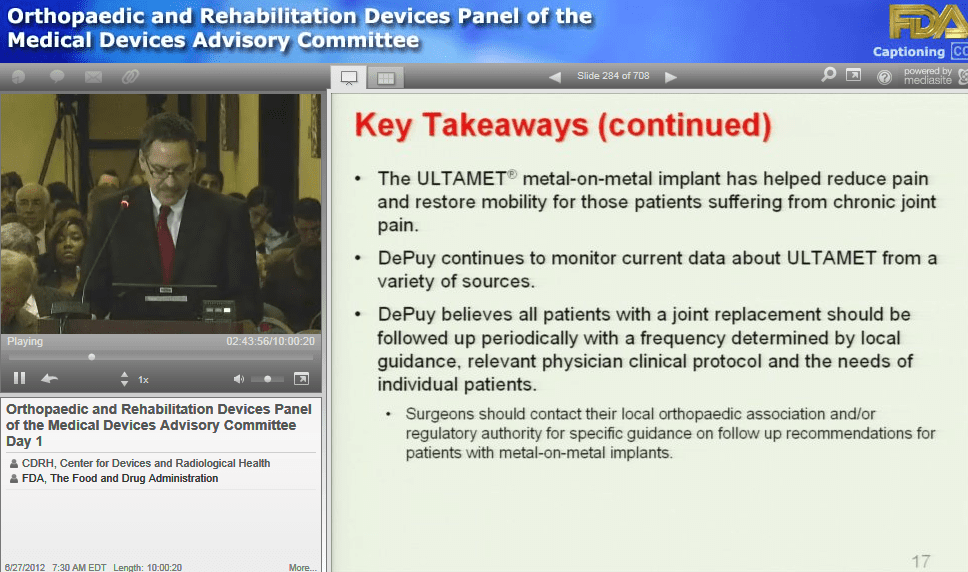The FDA’s MoM Panel (Part II)
This blog is a continuation of “The FDA’s MoM Panel” which you should read first in order to have a clear idea of what happened at this important event. Click here to go back to Part I.
The Manufacturers
All major manufacturers still selling MoM hip implants were invited to speak; however, only Biomet, DePuy and Corin sent representatives.
Biomet’s Vice President of Research Dave Schroeder and Vice President of Global Clinical Research Jing Xie, PhD did state that corrosion is a problem Biomet is continuing to address in its research. However, they emphasized that patients with Biomet MoM implants have lower levels of metal than other implants, and there are many factors that can affect patient outcomes such as implant design and the metals used. They recommended that each implant model be taken on its own merit, and that the FDA should avoid putting all MoM implants into one category.
Paul Voorhoost, the Director of Biostatistics and Data Management at DePuy, offered the ULTAMET implant as a representative of DePuy’s MoM hips. He cited studies showing that the implant is doing, if not better, then no worse than other implants on the market. He defended the industry shift to MoM implants, citing the logic that MoM surfaces wear less than the alternative polyethylene, allowing for greater head size, which is associated with a lower rate of dislocation.
Kathy Trier, PhD, Vice President Clinical and Regulatory Affairs at Corin, also presented her company’s implants as highly successful models that went through preclinical trials. She agreed with Mr. Band that patient selection and surgeon training is key to implant success, and recommended rigorous monitoring of MoM implants, including FDA inspections of the data provided by manufacturers.
The Foreign Regulatory Agencies
Also at the meeting were several regulatory bodies and professional societies from other countries: Britain’s Medicines and Healthcare products Regulatory Agency (MHRA), British Hip Society, and British Orthopaedic Association; Australia’s Therapeutic Goods Administration (TGA) and Australian Orthopedic Association; and Canada’s Orthopaedic Arthroplasty Society.
Britain’s speakers, Dr. Susan Ludgate and Dr. Skinner, related Britain’s experiences with MoM implants, their identification of particular issues with DePuy’s ASR hip implants, and recommendations for identification and follow up of problematic implants. From their perspective, while some MoM implants, mostly with large-diameter heads, have done badly, others have done very well. The situation calls for caution and monitoring.
Dr. Kaye Robertson, representing Australia’s TGA, revealed that they have not yet taken a position on MoM hip implants, and they are very skeptical as to the severity of the situation; however, they are monitoring MoM-related symptoms. Dr. Graham Mercer from the AOA echoed this approach, emphasizing that nothing is certain about what symptoms are caused by MoM implants and why, and recommending monitoring and consultation with experts.
Share This


